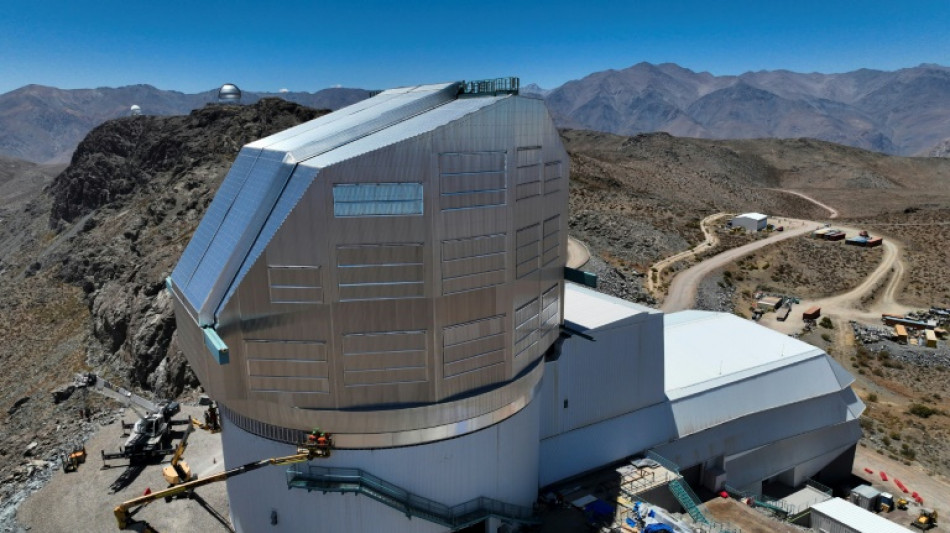
-
 Venezuelan president slams US over little girl's 'abduction'
Venezuelan president slams US over little girl's 'abduction'
-
Hard-right upstarts eye big gains in local UK polls

-
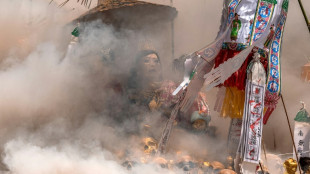 Skulls, smoke and spirits: Thai ceremony for the unclaimed dead
Skulls, smoke and spirits: Thai ceremony for the unclaimed dead
-
Canada's Carney: political newcomer who says he's best in a crisis

-
 Cavaliers scorch Heat to seal series sweep
Cavaliers scorch Heat to seal series sweep
-
Dead salmon create election stink on Australian island

-
 Mic check: Singapore's podcast boom amplifies opposition voices
Mic check: Singapore's podcast boom amplifies opposition voices
-
Markets rise as traders gear up for earnings, key jobs data

-
 Congress passes 'revenge porn' ban, sending it to Trump
Congress passes 'revenge porn' ban, sending it to Trump
-
Spain and Portugal work to restore power after massive blackout

-
 Less-thirsty rice offers hope in drought-stricken Chile
Less-thirsty rice offers hope in drought-stricken Chile
-
Yamal stardust could give Barca edge on Inter Milan

-
 Trump targets US 'sanctuary cities' in migrant crackdown
Trump targets US 'sanctuary cities' in migrant crackdown
-
Mexico agrees to send water to US after Trump threatens tariffs

-
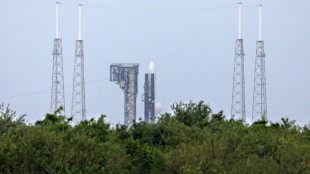 Amazon launches first Starlink-rival internet satellites
Amazon launches first Starlink-rival internet satellites
-
US lost seven multi-million-dollar drones in Yemen area since March
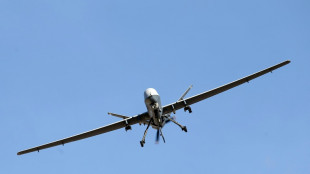
-
 Bucks blow as Lillard suffers torn Achilles: team
Bucks blow as Lillard suffers torn Achilles: team
-
Putin orders three-day truce amid new US warnings

-
 Real Madrid's Ancelotti agrees Brazil deal - reports
Real Madrid's Ancelotti agrees Brazil deal - reports
-
ChatGPT adds shopping help, intensifying Google rivalry

-
 Global stocks mixed amid trade hopes as markets await tech earnings
Global stocks mixed amid trade hopes as markets await tech earnings
-
Commanders heading back to D.C. after inking $3.7 bln stadium deal
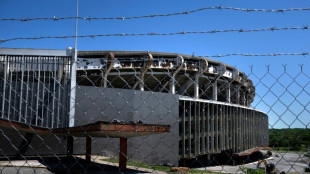
-
 US warplane falls off aircraft carrier into Red Sea
US warplane falls off aircraft carrier into Red Sea
-
Feisty Arteta urges Arsenal fans to 'bring boots' to PSG Champions League clash

-
 Bucks blow as Lillard suffers ruptured Achilles: reports
Bucks blow as Lillard suffers ruptured Achilles: reports
-
No power, no phone, no transport -- Spain in a panic
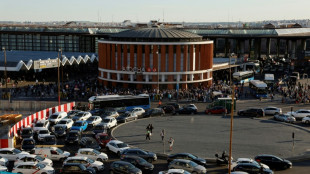
-
 US warplane went overboard into Red Sea: Navy
US warplane went overboard into Red Sea: Navy
-
'Like a dream' as IPL's 14-year-old Suryavanshi becomes youngest to hit T20 ton

-
 Luis Enrique says PSG have improved since October Arsenal loss
Luis Enrique says PSG have improved since October Arsenal loss
-
UN food, refugee agencies warn of huge cuts after funding losses

-
 Trump trade war dominates BRICS meeting in Brazil
Trump trade war dominates BRICS meeting in Brazil
-
Rashford expected to miss rest of Aston Villa season

-
 IPL's 14-year-old Suryavanshi youngest to hit T20 ton as Rajasthan rule
IPL's 14-year-old Suryavanshi youngest to hit T20 ton as Rajasthan rule
-
Halle Berry, Jeremy Strong to join Cannes film festival jury: organisers

-
 Klopp congratulates Liverpool on Premier League triumph
Klopp congratulates Liverpool on Premier League triumph
-
Violence-weary Trinidadians vote in general election

-
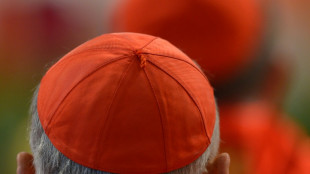 Abuse scandal in focus in search for new pope
Abuse scandal in focus in search for new pope
-
Prince William and Kate mark wedding anniversary in Scotland

-
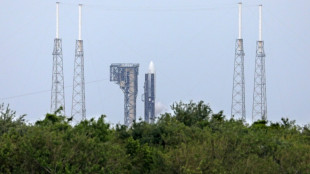 Amazon set for launch of Starlink-rival satellites
Amazon set for launch of Starlink-rival satellites
-
London mayor Sadiq Khan targets Olympic history for city

-
 Stock markets diverge amid trade hopes, ahead of earnings
Stock markets diverge amid trade hopes, ahead of earnings
-
Canada votes as Trump renews US takeover push

-
 Massive blackout hits all of Spain and Portugal
Massive blackout hits all of Spain and Portugal
-
Conclave starts May 7, cardinals say new pope must tackle abuse

-
 BRICS ministers meet in Brazil over Trump trade policies
BRICS ministers meet in Brazil over Trump trade policies
-
Trump escalates immigration crackdown to mark 100 days

-
 Outkast, White Stripes, Cyndi Lauper among Rock Hall inductees
Outkast, White Stripes, Cyndi Lauper among Rock Hall inductees
-
Putin orders three-day truce in May but Ukraine asks 'Why wait?'

-
 Eubank Jr discharged from hospital following boxing grudge match
Eubank Jr discharged from hospital following boxing grudge match
-
China deploys army of fake NGOs at UN to intimidate critics: media probe
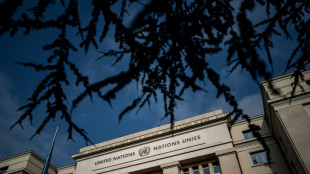

Astronomers in Chile to scour universe with car-sized mega camera
Surrounded by the desert mountains and clear blue sky of northern Chile, astronomers from the Vera C. Rubin Observatory hope to revolutionize the study of the universe by affixing the world's largest-ever digital camera to a telescope.
The size of a small car and weighing 2.8 metric tons, the sophisticated piece of equipment will reveal views of the cosmos as never before, officials from the US-funded project told AFP.
Beginning in early 2025, when the $800 million camera will snap its first photos, the machine will sweep the sky every three days, allowing scientists to reach new heights in their galactic analyses.
Researchers will be able to go from "studying one star and knowing everything in-depth about that one star, to studying thousands of stars at a time," said Bruno Dias, president of the Chilean Society of Astronomy (Sochias).
According to Stuartt Corder, deputy director of NOIRLab, the US research center running the observatory located 2,500 meters (8,200 feet) up the Cerro Pachon mountain, 560 kilometers (350 miles) north of Santiago, the new facility will usher in "a paradigm shift in astronomy."
The project solidifies Chile's dominant position in astronomical observation, as the South American country is home to a third of the globe's most powerful telescopes, according to Sochias, and boasts among the clearest skies on the planet.
The Rubin Observatory camera's first task will be to complete a 10-year review of the sky, called the Legacy Survey of Space and Time (LSST), which researchers hope will reveal information about 20 million galaxies, 17 billion stars and six million space objects.
The survey will give scientists an up-to-date inventory of images of the solar system, allow them to map our own galaxy, the Milky Way, and delve deeper into the study of energy and dark matter.
- 300 TVs for one picture -
The new camera will be able to capture 3,200-megapixel photos -- resulting in images so large they would require more than 300 average-size high-definition televisions, lined up together, to view just one.
The machine, built in California, will have triple the capacity of the world's current most powerful camera, the 870-megapixel Hyper Suprime-Cam in Japan, and will have six times the capacity of NOIRLab's most powerful camera.
The lab's existing top camera, on Chile's Cerro Tololo mountain, is only 520 megapixels, according to Jacques Sebag, head of construction of the Rubin telescope.
Chile's telescopes have come a long way since the 40-centimeter Cerro Tololo telescope, at the country's first international observatory, installed in the 1960s.
"That telescope arrived here on the back of a mule, because there was no road," said Stephen Heathcote, director of the Cerro Tololo Inter-American Observatory, only 20 kilometers from Cerro Pachon.
- Astronomy capital of the world -
The Vera C. Rubin Observatory, named in honor of the US astronomer who discovered dark matter, will join several other space observation research centers in northern Chile.
The natural conditions of the region's desert landscape -- tucked between the Pacific Ocean and the Andes mountain range -- creates the clearest skies on the planet, thanks to a dry climate with little cloud cover.
The area plays host to telescopes from more than 30 countries, including some of the most powerful astronomical instruments in the world, such as the radio telescope at the ALMA Observatory and the under-construction Extremely Large Telescope, which by 2027 is set to be able to view never-before-seen reaches of the universe.
Many of humanity's most important astronomical discoveries have been made at the Cerro Tololo observatory, such as the 2011 Nobel Prize-winning revelation that expansion of the universe is picking up speed, a phenomenon known as cosmic acceleration.
Though other influential observatories have been opened around the globe, including in the United States, Australia, China and Spain, "Chile is unbeatable" in the world of astronomy, said Dias, the Sochias president.
S.F.Warren--AMWN
